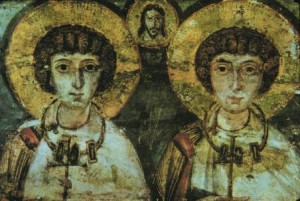There is an unfortunate tendency both within the Church and within society in general to feminize religion. While it’s true that women generally tend to be more religious than men, this trend of feminization has some very costly side-effects. It means making things soft, and comfortable, including the saints. This softness exacerbates the problem, driving off men by the droves, because seriously, what man in his right mind wants to sit through Kumbaya and lectures from old hippy nuns.
But is it all true? Is the Church a soft, dainty thing. The sort of thing that makes even most women want to hurl?
Well, one look at the communion of saints would seem to say otherwise. In fact, the history of the Church is filled with enough heroism and testosterone that even old bushy lip would be proud.
Thus, I think it’s high time that some serious effort be put into highlighting the general bad-assery of some of our most manly saints, as there is a very good chance that some of them may just have been, despite all obstacles, the Ubermensch.
Let us begin this discussion with Opus Dei founder, St. Josemaria Escriva.
We should begin by remembering that Josemaria lived through the Spanish Civil War, one of the most bloody, violent, and fervently anti-Catholic conflicts in recent history. Big whoop, he survived a war, so did a lot of people. But, not only did he survive the war, he created and fostered the growth of Catholic community, Opus Dei, in the midst of the violence and destruction of the war.
So, he’s creative, forming a new community, and he suffered through war without falling victim to self-victimization.
Nietzsche approves.
But where St. Josemaria’s truest bad-assery (and his Overman status) comes from his writings and teachings. His works focus mainly on the internal struggle, the growth of the most heroic element of any man; interior life to fight against the temptation to be a part of the faceless herd that is modern society.
(This is also the basic teaching of Nietzsche’s Ubermensch/prophet, Zarathustra.)
Further bringing St. Josemaria into the realm of “manly as hell”
is his writings on struggle.
“If you respond to the call the Lord has made to you, your life will leave a deep and wide furrow in the history of the human race, a clear and fertile furrow, eternal and godly.” –The Forge
Aha! I’ve caught it now! He is indeed the Ubermensch. Calling men to live lives which would bear a fertile cleave within the history of man, thus placing the Christian, who lives properly, well above the baser instinct driven man who lives not through the interior life, but by external niceties.
But there is one last similarity which leads me to believe that we have found a truly great man (in the Nietzschean sense of the term).
“And when I saw my devil, I found him serious, thorough, profound, solemn: he was the spirit of gravity – through him all things fall. Not by wrath, but by laughter do we slay. Come, let us slay the spirit of gravity!” –Thus Spake Zarathustra
Yes, it would seem that an Ubermensch would simply not be an Ubermensch without a sense of humor. And while our dear St. Josemaria has a reputation for being a rigid, disciplined man, he has just as much of a reputation as a fun-loving prankster. Even going so far as to have a false door painted on the wall of the Opus Dei headquarters so that he could trick visitors into walking into it.
So, it would appear that not only is the Church not a fluffy thing, filled with kind sentiments and external friendliness, but it’s also the home to at least one man who’s heroism and general manliness are of Nietzschean proportions.
Expect more to come in this series on the Ubermensch elements of Christianity.











